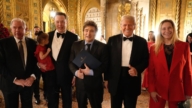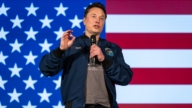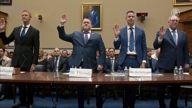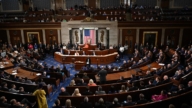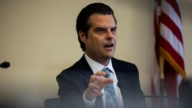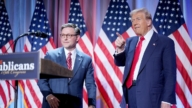【新唐人2012年2月10日讯】加拿大总理哈珀带领访华团,展开对华访问的行程。截至目前,已经与中共方面进行了会谈,签署了多项协议。加拿大媒体分析认为,哈珀此行共有七大主题,但在人权和经济方面能否达到所希望的结果,成为外界最关注的焦点。
哈珀7号晚抵达北京,对中国展开为期5天的访问。这是哈珀2006年就任加拿大总理后第二次访华,随行人员有12位政府首长和国会议员,以及由40名加拿大商界领袖组成的商务代表团。
加拿大媒体分析,加拿大总理哈珀这次中国之行,将完成七大使命,包括向中国出售能源、讨论人权,以及租借大熊猫等。
哈珀8号向温家宝提出,希望中方不要再阻挡联合国安理会制止叙利亚流血冲突的决议。同时谈到了被中共囚禁的政治犯—-加拿大公民玉江山的问题。
现居温哥华的前宁波工程学院教授张新宇表示,人权是加拿大总理这个位置上的事情,是哈珀的工作。
前宁波工程学院教授张新宇:“可以这么说,因为哈珀他的保守党是非常讲原则的。我相信他该说的一定会说。 这是加拿大总理这个位置上的,好像开车一样,这个司机他必须要做的事情。”
不过,哈珀过去在人权方面经常批评中共,因此被北京视为一个难打交道的对手。
张新宇:“加拿大保守党上台以后,他一直关注中国的人权,没有按照中共政府的意思去办的话,反而他的经济指标每年的贸易量还增加了,这就说明了,实际上迁就中共人权的这些隐情,不一定对经济有好处。”
哈珀自2006年初上台执政以来,一直关注中国的人权状况。他拒绝出席2008年的北京奥运开幕式﹔也曾经表示,加拿大政府不会“出卖”人权和民主、自由等重要的价值观,以换取巨额金钱﹔他还与西藏流亡精神领袖达赖喇嘛会面,因此激怒中共。
截至9号,哈珀已经与中方签署了一些贸易协议,其中包括牛肉牛脂的出口。另外,还签署了外商投资保护协议(FIPA)的意向声明书(A declaration of intent )。这项协议协商了近20年,但仍然需要在加拿大国会中辩论和批准。
外商投资保护协议(FIPA)的主要内容是:保证外资在中国市场有平等的机会。
中国问题专家章家敦认为,这样的协议不会对在华的加国企业有实质的保护,在华做生意的加国公司也很难获得期望的利益。
章家敦:“问题就在于中国(共)总是不执行这样的协议。所以这种协议实际是单方面的,只有外商会去遵照,而中方却不执行。最终这样的协议没有实质的意义。”
章家敦指出,中共政府一直想削弱在华外资企业,中共偷窃他们的技术还监禁他们的员工,这意味着外企在中国的机会越来越少。
去年9月,台湾近两百名台商,在台北街头游行,高呼“投资中国,死路一条” 的口号,反对马英九政府与中共签署投资保障协议。
新唐人记者陈汉、唐睿、薛莉采访报导。
Canadian PM Visits China to Accomplish Seven Goals
Human Rights and Economy Come into Focus Again
The Canadian Prime Minister, Stephen Harper, led a
delegation to visit China.
The two sides had meetings and signed several agreements.
Canadian Media analyses that Harper’s visit involved
seven discussion points, and human rights and the economy came into focus.
Harper arrived in Beijing on the 7th for a five day visit, which
was his second visit to China since he became prime minister in 2006.
Accompaniers were 12 government leaders and congressmen,
as well as 40 Canadian business leaders.
Canadian Media analyses that Harper’s visit to china would
achieve seven missions,
which included selling energy to China,
discussing human rights, and leasing pandas.
On the 8th, Harper expressed to Wen Jiabao that he hopes
China won’t obstruct the determination made by UN Security Council so as to repress Syria’s sanguinary conflict.
Meanwhile, he mentioned the issue of Canadian resident Yu
Jiangshan, the political activist currently imprisoned by the CCP.
Zhang Xinyu, a former Prof. at Ningbo Engineer College,
now living in Vancouver, said that human rights issues are the Canadian PM’s work, i.e. Harper’s job.
Zhang Xinyu, “Harper’s Conservative Party always keeps to
their principles.
I believe he could say what he should say.
He is the PM and that’s what he should do.”
Harper criticized CCP’s human rights track record,
and is considered a difficult opponent by CCP.
Zhang Xinyu, “when the Canadian conservative party took
office, Harper has focused on China’s human rights and has not been in line with CCP’s opinions.
However, economic indicators point to the fact that the annual
trade volume has increased.
It indicates that accommodating the CCP’s concealed human
rights abuses is not beneficial to the economy.”
Harper has focused on China’s human rights since he
became prime minister in 2006.
He refused to attend the opening ceremony of the 2008
Olympic Games.
He expressed that Canada would not betray human rights,
democracy, and freedom in order to obtain vast sums of money.
He also met with the Dalai Lama, which infuriated CCP.
Until Feb.9th, Harper had signed trade agreements with China,
including export of beef and tallow.
In addition, he signed a declaration of intent of Foreign
Investment Protection Agreement (FIPA).
This agreement had been in negotiation for 20 years, and still
needed to be debated before approval from the Canadian Congress.
The main content of FIPA discusses ensuring that foreign
investment has equal opportunity in China’s market.
Gorden Chang, expert of Chinese affairs, said that the agreement
would not protect Canadian enterprises in China, plus enterprises wouldn’t gain expected benefits.
Gorden Chang, “the reason is that the CCP won’t carry out
his agreement.
Only the foreign enterprises will obey it.
Therefore, the agreement doesn’t have material meaning.”
Gorden Chang pointed out that the CCP has attempted to
weaken foreign enterprises in China by stealing techniques
under the guise of supervising employees, which has created
less and less opportunity for foreign enterprises.
In last Sept., 200 Taiwanese businessmen protested in Taipei
using the slogan, “investing in China means disaster” to express
dissatisfaction with Ma Ying-jeou’s government signing an
Investment Security Agreement with the CCP.
NTD reporters Chen Han, Tang Rui and Xue Li


